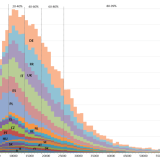EU context
Die EU legt in der europäischen Säule sozialer Rechte ihre Verpflichtungen in Bezug auf Löhne dar: Recht der Arbeitnehmer auf faire Löhne, die einen angemessenen Lebensstandard ermöglichen, Gewährleistung ausreichender Mindestlöhne, Verhinderung von Armut trotz Erwerbstätigkeit.
Tätigkeiten von Eurofound
Angesichts der sich verändernden wirtschaftlichen Rahmenbedingungen in Europa berichtet Eurofound regelmäßig über verschiedene Aspekte der Lohn- und Gehaltsentwicklung.
Überwachung der Lohnentwicklung
Über die Europäische Beobachtungsstelle für das Arbeitsleben (EurWORK) stellt Eurofound eine Reihe von Informationen zur Lohnentwicklung zusammen. Durch die regelmäßige Berichterstattung können längere Beobachtungszeitreihen zu tarifvertraglich vereinbarten Löhnen angelegt werden, sodass eine Überwachung der Tendenzen möglich ist. Eurofound veröffentlicht regelmäßig aktuelle Berichte über die gesetzlichen Mindestlöhne und tarifvertraglich vereinbarten Löhne. Außerdem werden nationale Entwicklungen in den Bereichen Mechanismen der Lohnfestsetzung, gleiches Arbeitsentgelt, variables Arbeitsentgelt, Niedriglohn und geschlechtsspezifisches Lohngefälle überwacht.
Die Länderprofile zum Arbeitsleben enthalten regelmäßig aktualisierte Informationen über Arbeitsentgelte auf nationaler Ebene. EurWORK führt zwei Datenbanken über die Lohnentwicklung (siehe nachstehende Ressourcen).
Der Europäische Jobmonitor (EJM) von Eurofound beurteilt Verschiebungen der Beschäftigung nach Tätigkeit auf Basis verschiedener qualitativer Messungen einschließlich der Lohnentwicklung. Insbesondere liefert er weitere Erkenntnisse über das Phänomen der Beschäftigungspolarisierung – d. h., inwieweit das Beschäftigungswachstum am oberen und unteren Ende der Lohnskala größer ist als in der Mitte.
Erhebungsdaten
Im Rahmen der von Eurofound durchgeführten Erhebungen werden auch die Entlohnungsbedingungen in der EU überwacht. Die Entlohnung spielt eine zentrale Rolle in der Forschungsarbeit von Eurofound zur Bewertung der Arbeitsqualität. In der Europäischen Erhebung über die Arbeitsbedingungen (EWCS) bildet das Einkommen einen von sieben Indizes zur Arbeitsplatzqualität. Die EWCS enthält auch Informationen über die geschlechtsspezifischen Unterschiede bei der Entlohnung. Weiterführende Informationen liefert das interaktive Tool zur Datenvisualisierung für die EWCS.
Die Europäische Erhebung zur Lebensqualität (EQLS) beobachtet die Auswirkungen des Einkommens auf den Lebensstandard und geht der Frage nach, in welchem Zusammenhang Einkommensunterschiede mit dem sozialen Zusammenhalt und Wohlbefinden stehen. Sie analysiert, wie sich die Krise vor allem auf einkommensschwache Familien, Haushaltsschulden und von Armut bedrohte Gruppen ausgewirkt hat. Im Rahmen der EQLS werden auch Informationen über das Einkommen im Ruhestand und Möglichkeiten zur Verlängerung des Arbeitslebens erfasst. Weiterführende Informationen liefert das interaktive Tool zur Datenvisualisierung für die EQLS.
Die Europäische Unternehmenserhebung (ECS) erfasst die Anwendung variabler Vergütungssysteme in Betrieben sowie die Zahl der Arbeitnehmer in diesen Betrieben, die unter Tarifverträge fallen. Die Erhebung bietet die Möglichkeit, die Informationen über variable Lohnzahlungen und Lohnverhandlungen mit Informationen über die Arbeitsorganisation, Personalverwaltung, direkte Mitarbeiterbeteiligung und den Sozialdialog sowie mit der Leistung und dem Wohlbefinden am Arbeitsplatz zu verknüpfen.





























